|
De Jamaicaanse schrijver Colin Channer werd geboren op 13 oktober 1963 in Kingston. Zie ook mijn blog van 13 oktober 2010 en eveneens alle tags voor Colin Channer op dit blog.
Uit: Waiting in Vain
“The juice was inking the nib between her legs, making her want to draft an epic on his face. Couldn't he just screw her? She'd take just that. So what if the love was gone? The first time had been just a screw. And she had no regrets. Seeing him nude that first time had made her think of holidays, of turkey legs slathered with gravy. At first she thought he'd be a rammer, a longhorn bedroom bully, which would've been fine. She liked a little roughness at times. But he held her like a dancer, assumed that he would lead, and frigged her with finesse. He understood her needs. Wordplay for him was foreplay. Her thighs were the covers of an open book--a journal lined with fantasies and fears. He read her like a child read, slowly, with his nose against the page, using a finger to guide his way. So he knew when to baby her and when to bitch her up.
If he didn't want to screw her, she thought, couldn't they just flirt? Flirting was more than his pastime. It was an addiction. He couldn't help himself. He was intelligent and amusing, which was why women fell for him. That's why she had fallen. In the days when he loved her, his wordskissed her ears like butterfly wings. Now they stung like wasps: "I don't want you anymore. Leave me alone. I don't care how you feel."
She forced a smile. He didn't respond, but she knew he wanted her. She could feel it. What to do? What to say? She wanted to be the mango so he could suck her down to the seed.
"Kiss me."
The words were hers. He tried to resist. Thought he had, until his tongue was a honey stick in hot tea. Soon he was melting into memory . . . into their first kiss ten years ago in Cuba.”
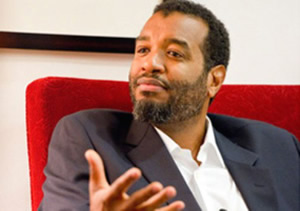
Colin Channer (Kingston, 13 oktober 1963)
De Nederlandse schrijver Herman Franke werd geboren op 13 oktober 1948 in Groningen. Zie ook mijn blog van 13 oktober 2010 en eveneens alle tags voor Herman Franke op dit blog.
Uit: De ziel van Nederland
“Met gezichten, kortom, moet je voorzichtig zijn. Neem mij nou. Zonder plastische chirurgie kreeg ik ruim tien jaar geleden een januskop, in mijn herinnering zelfs van de ene dag op de andere. Het was in de herfst van een buitengewoon zomers jaar. Ik ging achter mijn bureau zitten en tikte de openingszin van Weg van loze dromen, mijn eerste roman. Er stond natuurlijk geen spiegel voor me, ik kon niet zien wat voor gezicht ik erbij trok, maar de vertrouwde, vastberaden en grimmige trekken van de betoger in mij maakten voelbaar plaats voor de open, enigszins verbaasde gezichtsuitdrukking van de verteller die ik aan het worden was, misschien, want de roman was nog lang niet af, en wat er na die eerste zin moest volgen, stond me slechts vaag voor ogen. En het kan niet missen dat op mijn gezicht ook te lezen viel dat ik met een mengeling van angst en opwinding geen vaste grond meer onder me voelde. Er gaapte een afgrond waar kort tevoren nog de vertrouwde weg liep die van probleemstelling naar conclusies voerde.
De fascinerende maar ook imponerende onbegrensdheid van de creatieve vrijheid was me niet helemaal onbekend. Al eerder in mijn leven had ik verhalen geschreven, maar toen wist ik nog niet wat wetenschappelijk betogen inhield, terwijl mijn verhalen daar juist veel te veel op leken. Ik herinner me nog een ‘verhaal’ waarin ik met strakke hand mijn arme personages in een wanhopige situatie manoeuvreerde die mij in staat stelde literair verantwoord een favoriete sociologische theorie op hen los te laten. Ik had toen net Sociology as an Art Form van Robert Nisbet gelezen. In dit boek betoogt Nisbet dat sociologen evenals kunstenaars landschappen en portretten schilderen, zij het in culturele en sociaaleconomische zin, en dat de grote wetenschappelijke ontdekkingen evenals de werken van kunstenaars aan de verbeelding ontspruiten.
‘What else is imagination but the moving around in the mind, restlessly, compulsively, so often randomly, of images with which to express and to contain some aspect of perceived reality?’ vraagt Nisbet zich af. Tussen kunst en wetenschap bestaat volgens hem eigenlijk nauwelijks verschil:
There is in science and art alike the drive on the part of the creator to get away from the ordinary world of perception and of what we like to think of as common sense.
Dit sprak mij allemaal wel aan destijds, wat er in retroperspectief op wijst dat ik toen al aanleg had voor een januskop, maar ik was nog geen verteller en in de wetenschap kwam ik nog maar net kijken.”
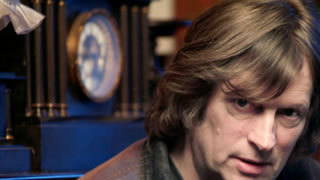
Herman Franke (13 oktober 1946 – 14 augustus 2010)
De Amerikaanse dichter, literair criticus, essayist en vertaler Richard Joseph Howard werd geboren op 13 oktober 1929 in Cleveland, Ohio. Zie ook alle tags voor Richard Howard op dit blog.
Oystering
Secret they are, sealed, annealed, and brainless
And solitary as Dickens said, but
They have something to say: that there is more
Than one way to yield. The first—and the hardest.
The most nearly hindered—is when you pull
Them off the rocks, a stinking, sawing sedge
Sucking them back under the black mud, full
Of hermit crabs and their borrowed snailshells,
Minnows scattering like superstitions,
The surf dragging, and every power
Life permits them holding out, holding on
For dear life. Sometimes the stones give way first.
Before they will, but still we gather them,
Even if our hands are bloody as meat,
For a lunch Queen Victoria preferred:
"A barrel of Wellfleet oysters, points down"
Could last across the ocean, all the way
To Windsor, wakening a widow's taste.
We ate them this afternoon, out of their
Armor that was formidably grooved, though
It proved our own reversal wiser still:
Keep the bones and stones inside, or never
Leave the sea. "He was a brave man," Swift said,
"Who first eat one." Even now, precedent
Of centuries is not always enough.
Driving the knife into muscles that mould
The valves so close to being impartial.
Surrender, when it comes—and it must come:
Lavish after that first grudging release
Back there in the sea, the giving over
Of despair, this time—makes me speculate.
Like Oscar and oysters, I feel "always
Slightly immortal when in the sea": what
Happens now we are out? Is the risk worth
While for a potential pearl? No, what we're
Really after is the moment of release,
The turn and tear of the blade that tightens,
Tortures, ultimately tells. When you spread
The shells, something always sticks to the wrong
One, and a few drops of liquor dribble
Into the sand. Scrape it off: in the full
Half, as well as a Fautrier, a Zen
Garden, and the smell of herring brine that
Ferenczi said we remember from the womb,
Lunch is served, in shiny stoneware sockets,
Blue milk in the sea's filthiest cup. More
Easily an emblem for the inner man
Than dinner, sundered, for the stomach. We
Take them queasily, wonder as we gulp
When it is—then, now, tomorrow—they're dead.
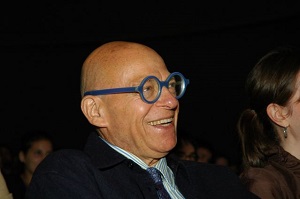
Richard Howard (Cleveland, 13 oktober 1929)
De Albanese dichter Migjeni (eigen. Millosh Gjergj Nikolla) werd geboren op 13 oktober 1911 in Shkodra. Zie ook mijn blog van 13 oktober 2010 en eveneens alle tags voor Migjeni op dit blog.
Fragment
On the mercy of the merciless
The little beggar survived.
His life ran its course
In dirty streets,
In dark corners,
In cold doorways,
Among fallacious faiths.
But one day, when the world's pity dried up
He felt in his breast the stab
Of a new pain, which contempt
Fosters in the hearts
Of the poor.
And - though yesterday a little beggar,
He now became something new.
An avenger of the past,
He conceived an imprecation
To pronounce to the world,
His throat strained
To bring out the word
Which his rage had gripped
And smothered on his lips.
Speechless he sat
At the crossroads,
When the wheels of a passing car
Quickly crushed
And... silenced him.
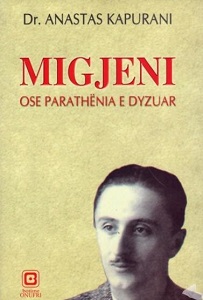
Migjeni (13 oktober 1911 – 26 augustus 1938)
Cover
De Amerikaanse dichter en schrijver Arna Wendell Bontemps werd geboren op 13 oktober 1902 in Alexandria in Louisiana. Zie ook mijn blog van 13 oktober 2010 en eveneens alle tags voor Arna Wendell Bontemps op dit blog.
Uit: God Sends Sunday
“Augie had never been on hand to see it dock, but he had often watched it from the big barn gate where, sitting on the top-piece, he could see everything plainly-the rousters loading and unloading barrels, the old white captain with the mutton-chop whiskers, and the black loafers standing along the plank in the sunshine.
One spring morning, however, his chance came. A young heifer that Augie was about to stake in the clover field suddenly kicked up her heels and started down toward the river, the chain and stake dangling behind. Augie had to follow her till she became tired of running before he could get his hands on the chain, and when he did he realized that he was a long way from home. Returning, he saw a crowd of folks at the landing, and his heart leapt. It had not occurred to him that the day was the second Wednesday, but there was the P. T. Blain splashing and booming against the piles.
Augie climbed a stack of boxes and sat with the heifer's chain across his arm. He was speech- less with pleasure. Wouldn't he like to ride in a boat like that! Folks said it went to New Orleans, but that was not important. He could not imagine such a boat going anywhere that was not infinitely desirable.
The rousters worked rapidly. A loud-mouthed crew, they drew the attention of several oilyfaced young women who stood by, giggling. It was a sight to watch those half-clothed men at their work; ascending and descending the plank, their movements suggested cats. The fine elastic muscles slipped loosely under their skin and their moist bronze shoulders glowed like metal. When they were finished they promptly went aboard and withdrew the plank.“
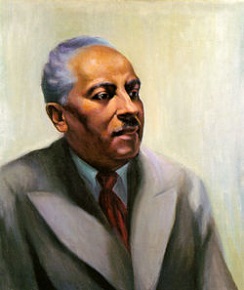
Arna Wendell Bontemps (13 oktober 1902 – 4 juni 1973)
Portret door Weinold Reiss, z.j.
De Amerikaanse schrijver Conrad Richter werd geboren op 13 oktober 1890 in Pine Grove, Pennsylvania. Zie ook mijn blog van 13 oktober 2010 en eveneens alle tags voor Conrad Richter op dit blog.
Uit: The Light in the Forest
“The boy was about fifteen years old. He tried to stand very straight and still when he heard the news, but inside of him everything had gone black. It wasn't that he couldn't endure pain. In summer he would put a stone hot from the fire on his flesh to see how long he could stand it. In winter he would sit in the icy river until his Indian father smoking on the bank said he could come out. It made him strong against any hardship that would come to him, his father said. But if it had any effect on this thing that had come to him now, the boy couldn't tell what it was.
For days word had been reaching the Indian village that the Lenni Lenape and Shawanose must give up their white prisoners. Never for a moment did the boy dream that it meant him. Why, he had been one of them since he could remember! Cuyloga was his father. Eleven years past he had been adopted to take the place of a son dead from the yellow vomit. More than once he had been told how, when he was only four years old, his father had said words that took out his white blood and put Indian blood in its place. His white thoughts and meanness had been wiped away and the brave thoughts of the Indian put in their stead. Ever since, he had been True Son, the blood of Cuyloga and flesh of his flesh. For eleven years he had lived here, a native of this village on the Tuscarawas, a full member of the family. Then how could he be torn from his home like a sapling from the ground and given to the alien whites who were his enemy!”
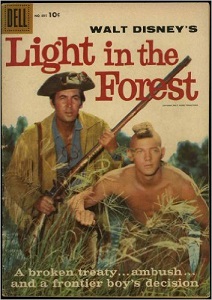
Conrad Richter (13 oktober 1890 – 30 oktober 1968)
Affiche voor Walt Disney's "The Light in the Forest" uit 1958
De Britse romanschrijfster en gewezen politica Edwina Currie werd geboren in Liverpool op 13 oktober 1946.Zie ook alle tags voor Edwina Currie op dit blog en ook mijn blog van 13 oktober 2010.
Uit: Diaries
“Clapham, Sunday, March 16, 10.45pm
Six weeks’ campaigning for the General Election in May? I don’t think so. I’ve booked the ferry for a few days in France over Easter.
Tower House, Saturday, April 5, 11.20pm
Four weeks from now, I’ll be packing a bag to go to the clinic. It looks like I’ll spend my first couple of days home alone, so I’ll have to live on chocolate milk.
I’ll manage. I have to. Bit like fighting the Election, I suppose. One foot in front of another, and you just keep going . . .”
Tower House, Saturday, April 12, 7.18am
Don’t think our useless campaign [in South Derbyshire] will make much difference to the voters, though it’s wearing and frustrating.
Thank goodness for my hormone tablets — without their calming effect I’d be screaming at everyone. Not that there are more than a handful of people — mainly old ladies — to scream at!
However. I’ll be doing a shoot with Patrick Lichfield next week — so my ‘old’ face will adorn my books for several years to come: pit”
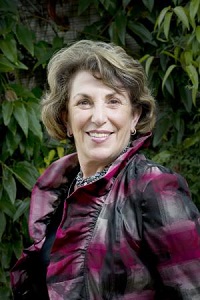
Edwina Currie (Liverpool, 13 oktober 1946)
|



